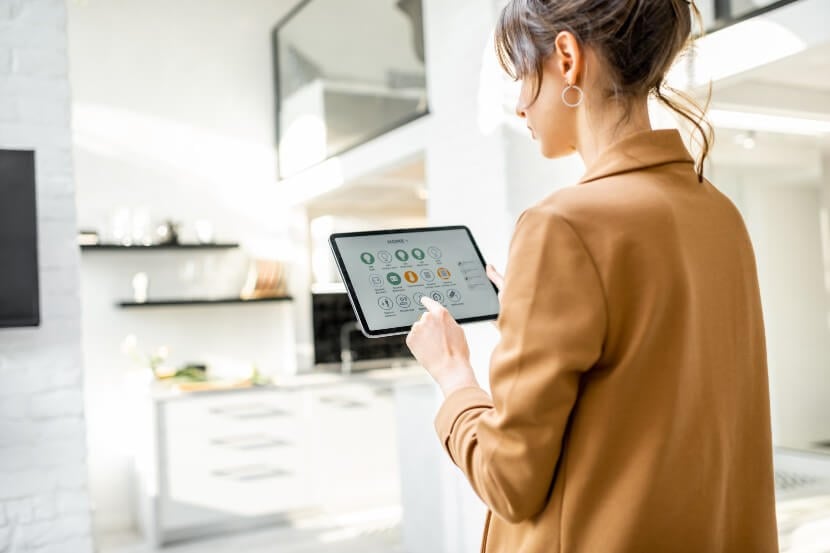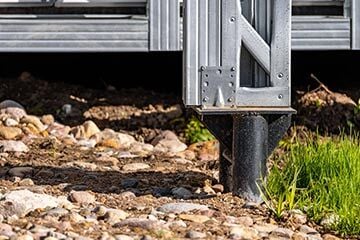Smart home technology means you can control and monitor everything from your smartphone, even if you're on the other side of the world.
A smart security system could lower the risk posed by break-ins and could cut your home insurance costs. Leak detectors can also watch over your water pipes and reduce the risk of water damage. So how does smart home insurance work?

What is smart home insurance?
Smart home insurance means the impact of your smart devices is taken into account when calculating your home insurance costs.
Smart devices mean it’s now possible to have an integrated smart home system where you can effectively lower risk on various fronts.
For instance, smart home systems can be comprised of a variety of devices, including:
- Smart locks
- Security sensors
- Video cameras
- Smoke alarms
- Leak detectors
Some insurers take consider smart home security when giving you a quote as it can lower your risk of making a home insurance claim.
What qualifies as a smart home?
A smart home has a range of devices set up to be controlled through the Internet of things (IoT).
IoT includes devices that are connected by sensors, software or on a network. You can control and monitor these devices through your smartphone or laptop. Typical IoT devices include:
- Heating
- Security devices
- Windows
- Doors
- TV
- Washing machine
As long as you have a good, stable internet connection, you should still be in control of your smart home’s system wherever you go in the world.
Smart homes also allow you to use a degree of automation to make life that much more convenient. Using home hubs like Google Home or tools like If This Then That, you can set routines such as:
- Turning on the heating when you're a certain distance away from home
- Turning off all lights and connected sockets when you're out of the house
- Making an announcement when your Ring door-cam detects motion outside your house
What’s the difference between a smart home and a connected home?
Smart home technology is different to connected home technology because it’s usually all integrated into one app. So you can control lots of different parts of your home through a control panel or app on your phone.
It also collects data and can work out your habits. For example, it might automatically put the heating on half an hour before you get up in the morning.
A connected home is anything you control through an app, either through Bluetooth or Wifi. These devices share data over a network or pair with other devices. They share data either one way or 2 ways.
For example, if you had a door sensor, your connected device could tell you if you’ve left a door open.
Some of the devices you could connect in your home could be:
- Thermostat apps
- Lighting plug ins
- Security system apps
Connected homes, while useful, aren’t usually able to automate like smart technology as they don’t store data.
Smart home security
Here are some of the security devices you can use as part of a smart home security system:
Smart locks
These can lock and unlock a keyless door. These have potential to be more secure than standard door locks.
Video camera
You can place smart video cameras anywhere in your home for constant monitoring. Or use cameras that trigger whenever they detect motion.
Video doorbell
These combine a doorbell, camera and microphone. You can view the camera feed on your smartphone and the device notifies you when someone's at your door.
Motion detectors
These detect unusual movements around the home and are often set up to work in tandem with smart cameras.
Door and window sensors
These tell you when a door or window has been opened.
Smart lights
You can remotely control and pre-program lights inside and outside your property.
Will a smart home make my insurance cheaper?
Most insurers offer lower prices based on the individual security devices you have on the system rather than the smart home system itself.
If a smart home system improves your security though, it should lower your costs.
For example, having security features like burglar alarms and security cameras improves security and should help reduce your insurance costs. This is regardless of whether they're connected to a smart security system.
Not all insurers currently offer discounts based on the smart security system itself, so it's best to check before committing to a policy. But smart home insurance could become increasingly common as more of us install smart home technology.
Is smart home insurance worth it?
Depending on how much you’ve spent on hi-tech security, you may not completely recover the cost through lower home insurance costs.
Smart home technology systems incorporating advanced security features could set you back hundreds or even thousands of pounds.
However, smart home security might give you some peace of mind and also deter burglars. This means you’re less likely to make a claim due to a break-in which would keep your no claims bonus Intact.
Also, having devices like leak detectors connected to your smart home system could also save you higher future costs by avoiding water damage.
How else can I lower my home insurance costs?
Here are some more ways to lower the cost of your home insurance:
Don't over-insure your home
Make sure you give a good estimate of your home and the value of its contents when you get a quote for home insurance. You might end up paying more if you overestimate.
Don't pay for insurance you don't need
For example, this might be cover for things like a garden or outbuildings when you live in a flat and don’t have a garden.
Pay your home insurance annually
Choosing to pay for your insurance annually rather than in monthly payments means it should cost less.
Build up a home insurance no-claims discount
If you don’t make any claims, you can usually earn a no-claims discount. The longer you go without making a claim, the bigger the discount.
Increase your home insurance excess
Selecting a higher voluntary home insurance excess could lower your costs. But remember that you have to pay that amount towards any claim you make.







